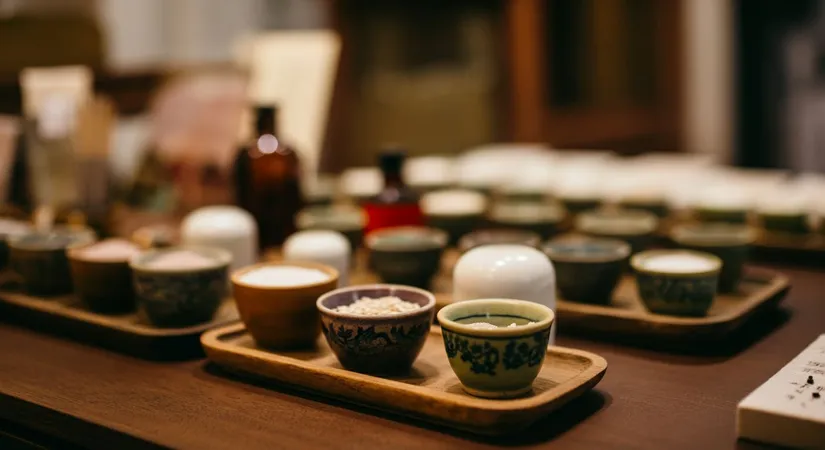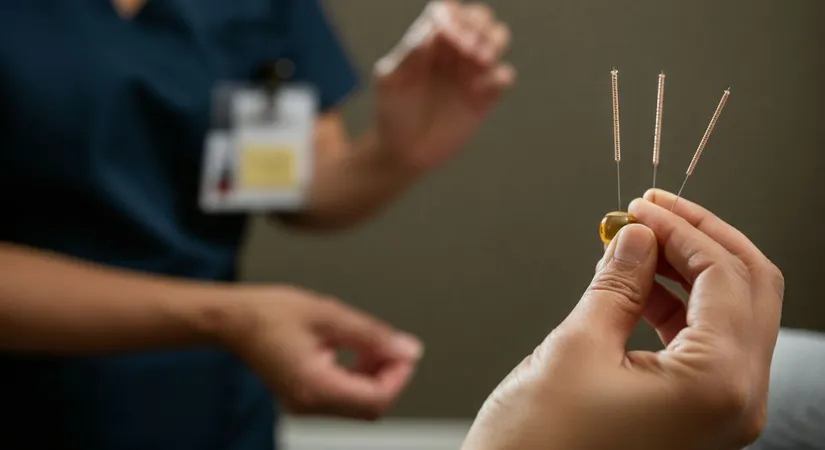Discover Eastern Medicine Near Me: Unlocking Holistic Healing Paths
Explore Eastern medicine near you and embark on a healing journey with acupuncture and TCM insights.
Dive deep into the rich world of Eastern medicine. This guide unfolds the centuries-old practices of Traditional Chinese Medicine (TCM), known for its unique philosophy and natural methods. With its holistic approach, Eastern medicine has captivated the interest of many aiming for well-rounded health. In this journey, we will explore its impact through acupuncture, herbal remedies, and the invaluable art of balancing bodily energies.
Understanding Traditional Chinese Medicine: A Comprehensive Guide
Exploring the Core Principles of TCM
Traditional Chinese Medicine (TCM) is a holistic approach that emphasizes balance and harmony within the body. Central to TCM are the concepts of yin and yang, which represent opposing forces that must be balanced for optimal health. Qi, or life force, flows through the body and is essential for vitality. The five elements—wood, fire, earth, metal, and water—interact to influence bodily functions and health.Key Practices in Traditional Chinese Medicine
- Acupuncture: Involves inserting needles at specific points to balance Qi.
- Herbal Remedies: Utilizes plant-based substances to treat various ailments.
- Tai Chi and Qigong: Movement practices that enhance physical and mental well-being.
Steps to Achieve Balance Through TCM
- Identify Imbalances: Assess symptoms and lifestyle factors affecting health.
- Implement Treatments: Use acupuncture, herbs, or exercises to restore balance.
- Maintain Harmony: Adopt lifestyle changes to sustain health and prevent illness.

Exploring Acupuncture Services: How Does It Work?
Understanding the Mechanism of Acupuncture
Acupuncture, a cornerstone of traditional Chinese medicine, operates on the principle of balancing the body's energies. Practitioners insert thin needles into specific points on the body, known as acupoints, which are believed to connect with meridians—pathways through which life energy, or Qi, flows. By targeting these acupoints, acupuncture aims to unblock energy flow, restore balance, and promote healing.Benefits of Acupuncture Services
- Relief from chronic pain, such as back and neck pain, supported by numerous studies.
- Improvement in digestive health, with evidence showing enhanced gut function.
- Reduction in stress and anxiety levels, contributing to overall well-being.
Steps in an Acupuncture Session
- Initial Consultation: Discuss health history and current symptoms with the practitioner.
- Needle Insertion: Strategically place needles at acupoints to stimulate energy flow.
- Post-Treatment Assessment: Evaluate the session's effects and plan future treatments.

Holistic Health Benefits: Herbal Medicine for Anxiety
Understanding Herbal Medicine's Role in Anxiety Relief
Herbal medicine, a key component of traditional Chinese medicine (TCM), focuses on treating the root causes of ailments, offering a holistic approach to health. For anxiety, herbs like ginseng, chamomile, and ashwagandha are particularly effective due to their calming properties. These herbs work synergistically with the body's systems to restore balance and relieve stress, promoting overall well-being.Key Benefits of Herbal Medicine for Anxiety
- Improved Mood: Herbs like chamomile can enhance mood by reducing stress hormones.
- Better Sleep: Ashwagandha is known to improve sleep quality, aiding relaxation.
- Reduced Nervous Tension: Ginseng helps in calming the nervous system, easing anxiety symptoms.
Steps to Incorporate Herbal Medicine for Anxiety
- Consult a Practitioner: Seek advice from a TCM expert to identify suitable herbs.
- Integrate Herbs: Include recommended herbs in your daily routine through teas or supplements.
- Monitor Effects: Regularly assess the impact on anxiety levels and adjust as needed.
Finding the Best Eastern Medicine Practitioners Near Me
Evaluating Credentials and Experience
When searching for the best eastern medicine practitioners, it's crucial to evaluate their credentials and experience. Look for certifications from reputable organizations, which indicate a practitioner's commitment to maintaining high standards. For instance, a practitioner certified by the National Certification Commission for Acupuncture and Oriental Medicine (NCCAOM) demonstrates a recognized level of expertise. Additionally, consider their years of experience and areas of specialization, as these factors can significantly influence the quality of care you receive.Key Factors to Consider When Choosing a Practitioner
- Certifications: Ensure they have credentials from recognized bodies like NCCAOM.
- Specialization: Look for practitioners with expertise in specific areas of interest.
- Patient Reviews: Read reviews to gauge patient satisfaction and treatment effectiveness.
Steps to Find the Right Practitioner
- Research Online: Use search engines and directories to find local practitioners.
- Verify Credentials: Check their certifications and affiliations with professional bodies.
- Schedule Consultations: Meet with potential practitioners to discuss your health needs and treatment options.
Seasonal Therapies in Eastern Medicine
Adapting Eastern Medicine to Seasonal Changes
Eastern medicine, particularly traditional Chinese medicine (TCM), emphasizes aligning bodily energies with nature's cycles to optimize health. Seasonal therapies are integral to this approach, offering targeted treatments that correspond to the changing seasons. For instance, spring detoxification focuses on cleansing the liver, which is believed to be more active during this time. This practice helps eliminate toxins accumulated over winter, preparing the body for renewal and growth.Key Seasonal Therapies in Eastern Medicine
- Spring Detox: Utilizes herbs like dandelion and milk thistle to support liver health.
- Summer Cooling: Incorporates foods and herbs that cool the body, such as mint and cucumber.
- Winter Warming: Focuses on warming foods and spices like ginger and cinnamon to boost immunity.
Steps to Implement Seasonal Therapies
- Assess Seasonal Needs: Identify which organ systems are most active in the current season.
- Select Appropriate Therapies: Choose treatments and herbs that align with seasonal changes.
- Monitor Health Outcomes: Regularly evaluate the effectiveness of therapies and adjust as needed.
The Role of Gua Sha and Other Complementary Treatments
Integrating Gua Sha with Traditional Chinese Medicine
Gua Sha, a therapeutic technique in traditional Chinese medicine (TCM), involves scraping the skin with a smooth-edged tool to enhance circulation and alleviate pain. When combined with acupuncture, Gua Sha can significantly amplify healing effects. This integration not only reduces inflammation but also boosts the immune system and addresses neurological and muscular complaints, providing a comprehensive approach to health maintenance.Benefits of Combining Gua Sha with Other Therapies
- Enhanced Circulation: Gua Sha promotes blood flow, improving nutrient delivery to tissues.
- Synergistic Healing: Combining with acupuncture enhances pain relief and recovery.
- Immune Support: Stimulates immune response, aiding in faster recovery from illnesses.
Steps to Integrate Gua Sha into Your Health Routine
- Consult a Practitioner: Seek guidance from a TCM expert to tailor treatments to your needs.
- Combine Therapies: Use Gua Sha alongside acupuncture or herbal medicine for optimal results.
- Monitor Progress: Regularly assess improvements in symptoms and adjust treatments as necessary.
Integrating Acupuncture and Herbal Medicine for Holistic Health
Traditional Chinese Medicine (TCM) employs a holistic approach, integrating acupuncture and herbal remedies to balance bodily energies and promote overall well-being. This synergy enhances the body's natural healing processes, offering a comprehensive path to health.
Practitioners of TCM are often certified by reputable organizations, ensuring a high standard of care. Their expertise in acupuncture and herbal medicine is backed by years of experience and specialized training, providing patients with reliable and effective treatments.
Herbal Medicine: A Natural Approach to Anxiety Management
Herbal medicine offers a natural alternative for managing anxiety, utilizing herbs like chamomile and ashwagandha to promote relaxation and improve mood. This approach aligns with the principles of natural healing, providing a gentle yet effective solution for mental well-being.
Patients who incorporate herbal medicine into their routines often report enhanced mood and better sleep quality, reflecting the positive impact of these natural remedies on their overall health and anxiety levels.
Frequently Asked Questions
What is Eastern Medicine and how does it differ from Western Medicine?
Eastern medicine, particularly Traditional Chinese Medicine (TCM), focuses on holistic health by balancing bodily energies and using natural healing methods. Unlike Western medicine, which often targets symptoms, TCM emphasizes prevention and treating the root causes of ailments through practices like acupuncture and herbal remedies.
How does acupuncture work in Traditional Chinese Medicine?
Acupuncture works by inserting thin needles into specific acupoints on the body to balance the flow of Qi, or life energy. This practice aims to unblock energy pathways, known as meridians, to restore balance and promote healing, making it a key component of acupuncture services in holistic health.
Is herbal medicine effective for managing anxiety?
Herbal medicine can be effective for managing anxiety by using herbs like chamomile and ashwagandha, which have calming properties. These natural remedies work with the body's systems to reduce stress and improve mood, offering a gentle alternative to pharmaceuticals for anxiety relief.
What should I consider when choosing the best Eastern medicine practitioners near me?
When choosing Eastern medicine practitioners, consider their certifications, such as those from the National Certification Commission for Acupuncture and Oriental Medicine (NCCAOM). Also, evaluate their experience, specialization, and patient reviews to ensure quality care and alignment with your health goals.
How can I incorporate seasonal therapies in Eastern medicine into my routine?
To incorporate seasonal therapies, assess which organ systems are most active in the current season and select appropriate treatments, such as spring detox or winter warming. Consult with a practitioner to tailor therapies to your needs and regularly monitor health outcomes for optimal results.
Discover the path to 'Healthy Beauty' with estethica's expert care. Call now for your free consultation and take the first step towards a more confident you!
📞 Call for Your Free Consultation
Fill in the Form
We call you immediately